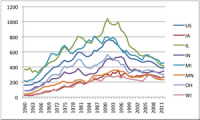-
Doctor-affiliated PACs fund candidates opposing gun safety policies
Researchers found that physician-affiliated political action committees provided more financial support to candidates who opposed increased background checks, contrary to many societies’ recommendations for evidence-based policies to reduce firearm injuries.
-
-
Israel fighting Iran’s efforts to upgrade Hezbollah’s rockets

Israel has been countering Iranian efforts to use suitcases to smuggle GPS components into Syria to upgrade Hezbollah’s rocket arsenal. In 2017, once it appeared that Syrian dictator Bashar al-Assad would survive the civil war that was tearing his country apart, “Iran embarked on a grandiose plan for increasing its influence in the shattered country,” says an expert. Iran’s goal was to “build a force of up to 100,000 Shiite fighters from Pakistan, Afghanistan and Iraq. They built intelligence bases and an air force base within each Syrian airbase. And they brought civilians in order to indoctrinate them,” said Israel Defense Force’s former chief of staff, Gen. Gadi Eisenkot.
-
-
There is no national emergency on the border, Mr. President
President Trump [last week] declared a national emergency on the border to construct some portion of his promised border fence. “We’re talking about an invasion of our country with drugs, with human traffickers, with all types of criminals and gangs,” President Trump said during his remarks. Lawyers will spill much ink arguing about the legalities surrounding the law and whether President Trump can declare a national emergency. Regardless of what the law ultimately means, no reasonable person can look at the southern border and agree that it rises to the level of a national emergency.
-
-
Reducing Illinois gun violence

Illinois could reduce the number of people killed each year by gun violence by implementing ten policies supported by available research, according to a new report. The Johns Hopkins report identifies weaknesses or gaps in current Illinois law and offers recommendations to reduce gun violence.
-
-
After Aurora shooting, lawmakers revive proposal to disarm unlawful gun owners
Illinois revokes thousands of gun licenses every year. But it’s rare for law enforcement to remove firearms from owners barred from having them. Legislators in Illinois are scrambling to address a gap in state law that many have blamed for allowing the gunman who killed five people in Aurora last week to keep his handgun even after he was banned from possessing firearms.
-
-
U.S. Coast Guard officer to be charged with mass terrorism plot
Christopher Paul Hasson, a U.S. Coast Guard officer will appear in court today (Thursday), charged with plotting a massive, 2-prong attack modeled after the 2011 Anders Behring Breivik’s terrorist attack in Norway. Breivik killed eight people in Oslo as a diversion, before killing 69 teenagers in a summer camp organized by the Norwegian Social Democratic Party. Hasson compiled a hit list of liberal politicians, Supreme Court judges, and journalists – but his violent plans extended to trying to “establish a white homeland,” and using biological weapons to “kill almost every last person on Earth.”
-
-
U.S. hate groups hit record number last year amid increased violence
American hate groups had a bumper year in 2018 as a surge in black and white nationalist groups lifted their number to a new record high, the Southern Poverty Law Center said in a report issued Wednesday. The increase was driven by growth in both black and white nationalist groups, the SPLC said. The number of white nationalist groups jumped from 100 to 148, while the number of black nationalist groups — typically anti-Semitic, anti-LGBTQ and anti-white — rose from 233 to 264. Some conservative groups have accused the SPLC of unfairly labeling them as “hate groups,” and last month, the Center for Immigration Studies sued the SPLC for “falsely designating” it as a hate group in 2016, saying the SPLC has produced no evidence that the group maligns immigrants as a class.
-
-
Putting data privacy in the hands of users
In today’s world of cloud computing, users of mobile apps and web services store personal data on remote data center servers. Services often aggregate multiple users’ data across servers to gain insights on, say, consumer shopping patterns to help recommend new items to specific users, or may share data with advertisers. Traditionally, however, users haven’t had the power to restrict how their data are processed and shared. New platform acts as a gatekeeper to ensure web services adhere to a user’s custom data restrictions.
-
-
U.S. will not take back Alabama woman who joined Islamic State
The United States claims Hoda Muthana does not have a U.S. passport, and has no right to obtain one. A lawyer for her family argued Muthana does have that right because she was born in New Jersey.
-
-
Seven MPs quit Labour over party’s failure to address anti-Semitism
Seven Labour politicians have quit Britain’s main opposition party over leader Jeremy Corbyn’s failure to tackle anti-Semitism and his approach to Brexit. They will sit as a new, independent group of MPs while planning their next steps in the worst Labour split for nearly 40 years.
-
-
Trump declares national emergency
President Donald Trump has declared a national emergency, bypassing Congress to build a wall along the southern U.S. border, and setting up a legal challenge that could help determine the limits of U.S. presidential power.
-
-
Can Congress or the courts reverse Trump’s national emergency?
President Donald Trump declared a national emergency to pay for the construction of a wall along the U.S.-Mexico border, after Congress, in its new spending bill, denied him the full money to build it. Presidents generally claim emergency power two ways: through inherent or implied authority under the U.S. Constitution or under statutory authority granted by Congress. The U.S. Constitution says nothing specific about presidential emergency power: Presidents can only claim such authority is implied or inherent. The emergency powers the Constitution does describe are actually assigned to Congress. Congress has delegated some emergency powers to the president through statutes, including the National Emergencies Act. But Congress retains the power to reject a president’s declaration of a national emergency. Now the question is: Will Congress use the power available to it, or will it play the role of passive spectator?
-
-
To be effective, terrorism prevention programs need strengthening
National capabilities for terrorism prevention — which refers to options other than traditional law-enforcement action to respond to the risk of individual radicalization to violence — are relatively limited, with most relying on local or non-government efforts and only a subset receiving federal support, according to a new report. to address the gaps in capability, the most effective path for the federal government would be to strengthen, broaden and sustain this local and non-governmental capacity. But such efforts will be hampered because past counterterrorism and countering-violent-extremism (CVE) efforts have significantly damaged trust in some communities.
-
-
On rogues and peers: Russian, Chinese challenges to U.S. national security
Russia and China represent distinct challenges to U.S. national security. Russia is not a peer or near-peer competitor but rather a well-armed rogue state that seeks to subvert an international order it can never hope to dominate. In contrast, China is a peer competitor that wants to shape an international order that it can aspire to dominate.
-
-
Guyana faces "creeping coup"
Venezuela is not the only country in South America facing political instability and crisis: After losing a parliamentary vote of non-confidence on December 21st, in the small neighboring country of Guyana, the government of President David Granger has refused to resign or schedule elections, in clear violation of the constitution.
-
More headlines
The long view
Factories First: Winning the Drone War Before It Starts
Wars are won by factories before they are won on the battlefield,Martin C. Feldmann writes, noting that the United States lacks the manufacturing depth for the coming drone age. Rectifying this situation “will take far more than procurement tweaks,” Feldmann writes. “It demands a national-level, wartime-scale industrial mobilization.”
No Nation Is an Island: The Dangers of Modern U.S. Isolationism
The resurgence of isolationist sentiment in American politics is understandable but misguided. While the desire to refocus on domestic renewal is justified, retreating from the world will not bring the security, prosperity, or sovereignty that its proponents promise. On the contrary, it invites instability, diminishes U.S. influence, and erodes the democratic order the U.S. helped forge.
Fragmented by Design: USAID’s Dismantling and the Future of American Foreign Aid
The Trump administration launched an aggressive restructuring of U.S. foreign aid, effectively dismantling the United States Agency for International Development (USAID). The humanitarian and geopolitical fallout of the demise of USAID includes shuttered clinics, destroyed food aid, and China’s growing influence in the global south. This new era of American soft power will determine how, and whether, the U.S. continues to lead in global development.
Water Wars: A Historic Agreement Between Mexico and US Is Ramping Up Border Tension
As climate change drives rising temperatures and changes in rainfall, Mexico and the US are in the middle of a conflict over water, putting an additional strain on their relationship. Partly due to constant droughts, Mexico has struggled to maintain its water deliveries for much of the last 25 years, deliveries to which it is obligated by a 1944 water-sharing agreement between the two countries.
How Disastrous Was the Trump-Putin Meeting?
In Alaska, Trump got played by Putin. Therefore, Steven Pifer writes, the European leaders and Zelensky have to “diplomatically offer suggestions to walk Trump back from a position that he does not appear to understand would be bad for Ukraine, bad for Europe, and bad for American interests. And they have to do so without setting off an explosion that could disrupt U.S.-Ukrainian and U.S.-European relations—all to the delight of Putin and the Kremlin.”
How Male Grievance Fuels Radicalization and Extremist Violence
Social extremism is evolving in reach and form. While traditional racial supremacy ideologies remain, contemporary movements are now often fueled by something more personal and emotionally resonant: male grievance.
